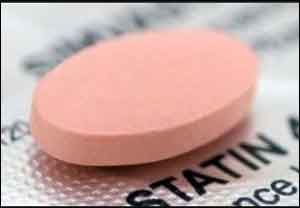- Home
- Editorial
- News
- Practice Guidelines
- Anesthesiology Guidelines
- Cancer Guidelines
- Cardiac Sciences Guidelines
- Critical Care Guidelines
- Dentistry Guidelines
- Dermatology Guidelines
- Diabetes and Endo Guidelines
- Diagnostics Guidelines
- ENT Guidelines
- Featured Practice Guidelines
- Gastroenterology Guidelines
- Geriatrics Guidelines
- Medicine Guidelines
- Nephrology Guidelines
- Neurosciences Guidelines
- Obs and Gynae Guidelines
- Ophthalmology Guidelines
- Orthopaedics Guidelines
- Paediatrics Guidelines
- Psychiatry Guidelines
- Pulmonology Guidelines
- Radiology Guidelines
- Surgery Guidelines
- Urology Guidelines
Statin safety -- American Heart Association clarifies

Are Statins Safe to use is a million dollar question which has been debated every now and then. There have been concerns about the side effects of statins which are far too many including some serious ones like hemorrhagic stroke, diabetes mellitus and some cases of autoimmune necrotizing myositis.
The wonder drug of the century developed primarily for controlling lipid-related diseases but found to be extremely effective in preventing cardiovascular disease. Today it is one of the heavily used medicine in the world with an enormous recommendation for preventing CVD. But certain adverse events related with statins have triggered debate among physicians and cardiologists.
American Heart Association has issued its first Scientific Statement on Statin Safety and Associated Adverse Event that has appeared in Arteriosclerosis, Thrombosis, and Vascular Biology. This statement has again initiated a debate about safety, adverse events, and tolerability of the drug.
There is no doubt that Statins are wonder drugs which have a major impact in reducing the incidence of cardiovascular diseases (CVD), including stroke. They are among the most commonly used pharmaceuticals in clinical practice with 200 million patients on this therapy worldwide
High-quality evidence from large randomized control trials (RCTs) have shown statins effectively reduce LDL-C and cardiovascular risk, are generally well-tolerated with low rates of adverse effects.
Atherosclerotic cardiovascular disease (ASCVD) continues to be the leading cause of mortality worldwide with approximately 17.7 million deaths annually, the majority of which are preventable. Statins and over 30 years of the clinical investigation show that statins exhibit few serious adverse effects.
One in 4 Americans >40 years of age takes a statin to reduce the risk of myocardial infarction, ischemic stroke, and other complications of atherosclerotic disease. The most effective statins produce a mean reduction in low-density lipoprotein cholesterol of 55% to 60% at the maximum dosage.
Most current guidelines recommend statin initiation when a person's 10-year CVD risk is 7.5%–10%. But some recent studies have shown that the benefits only began to outweigh the risks when CVD risk was 14% for men aged 40 to 49. For men 70 to 75 years, the threshold was 21%. For women, thresholds ranged from 17% to 22%.
Statins are safe for the majority of patients including demographics of patients with HIV, chronic kidney disease, elderly, children, and East Asian patient populations. Statins prevent primary cardiovascular events in 5% of patients treated for 5 years (who achieve a 77-mg/dL reduction in LDL) and prevent secondary events in 10% of those treated.
In the US, roughly 10% of patients stop taking a statin because of subjective complaints. Myopathy, including rhabdomyolysis, owing to statin use affects less than 0.1% of treated patients. Severe liver toxicity occurs roughly 0.001% of the time.Statins "modestly" increase the risk for diabetes, most often in patients with numerous other risk factors. The risk of statin-induced newly diagnosed diabetes mellitus is ≈0.2% per year of treatment, depending on the underlying risk of diabetes mellitus in the population studied.
Randomized controlled trials have shown no consistent increase in cataracts with the clinical use of statins. All statins have been shown to cause AKI, albeit via the mechanism of diffuse skeletal muscle injury, rhabdomyolysis, and subsequent myoglobinuria. In individuals without rare rhabdomyolysis, statins do not cause acute renal injury or worsen proteinuria long term.
There is no good evidence to suggest that statin use increases the risk of either tendonitis or tendon rupture. There is no current link between statins and cancer in humans.Only a small minority of symptoms are likely to be due to statin therapy as the majority would occur just as frequently on placebo in randomized trials.
Benefits and harms of Statins when it is used in 10,000 individuals over 5 years and achieves a 77 mg/dL reduction in LDL-C levels.
| Benefit | Estimated Number of Patients | ||||||||
| Prevented first major vascular event (primary prevention) | 500 | ||||||||
| Prevented recurrent major vascular event (secondary prevention) | 1000 | ||||||||
| Harm | |||||||||
| New diagnosis of diabetes mellitus | 100 | ||||||||
| Statin-associated muscle symptoms (without significant CK elevation) | <100 | ||||||||
| Myopathy (with CK elevation >10x ULN) | 5 | ||||||||
| Rhabdomyolysis | 1 | ||||||||
| Autoimmune myopathy | <1 | ||||||||
| Hemorrhagic stroke # | 10 | ||||||||
| Severe liver disease | <1 | ||||||||
This statement has clarified and highlighted the salient clinical practice lessons both primary and specialty providers should be aware of. It ultimately goes to prove that the benefits of statin therapy in reducing cardiovascular disease risk greatly outweigh the very small risks associated with statin use.

Disclaimer: This site is primarily intended for healthcare professionals. Any content/information on this website does not replace the advice of medical and/or health professionals and should not be construed as medical/diagnostic advice/endorsement or prescription. Use of this site is subject to our terms of use, privacy policy, advertisement policy. © 2020 Minerva Medical Treatment Pvt Ltd